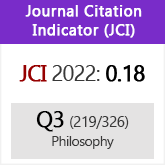República y revolución: la crítica de Schlegel a Kant
DOI:
https://doi.org/10.3989/isegoria.2022.66.04Palabras clave:
República, revolución, voluntad general, Kant, SchlegelResumen
El propósito de este artículo es analizar la crítica de Schlegel a la filosofía política de Kant respecto de dos temas: el ideal republicano y la justificación de la revolución. En el Versuch, Schlegel vincula república y democracia y se opone a la tesis de Kant, según la cual la revolución no es moralmente permisible. La insurrección del pueblo es reivindicada como una forma de acción política autorizada por la voluntad general, con el fin de acelerar la institución de un régimen republicano. Mi argumento es que la postura de Schlegel respecto de la justificación de la revolución se apoya en dos pilares: primero, en una concepción rousseauniana del pueblo como poder constituyente y, segundo, en el rechazo de la doctrina kantiana acerca de la absoluta necesidad racional del Estado.
Descargas
Citas
Beiser, F. (1990), Enlightment, revolution and romanticism: the genesis of modern German political thought 1790- 1800, Cambridge- Londres, Harvard University Press.
Batscha, Z. (1981), Studien zur politischen Theorie des deutschen Frühliberalismus, Suhrkamp, Frankfurt am Main.
Behler, E. (1987), "Friedrich Schlegels erster Aufenthalt in Jena: Vom 6. August 1796 bis zum 3. Juli 1797", MLN, vol. 102, no. 3, pp. 544-569. https://doi.org/10.2307/2905585
Byrd, S. y Hruschka, J. (2010), Kant's Doctrine of Right. A Commentary. Cambridge: Cambridge University Press. https://doi.org/10.1017/CBO9780511712050
Dann, O. (2002), "Kant's Republicanism and its Echoes", en Republicanism and Liberalism in America and the German States 1750-1850, edited by J. Heidiking and J. Henretta, Cambridge, Cambridge University Press, pp. 53-72. https://doi.org/10.1017/CBO9781139052313.004
Fiorillo, V. (2002), "Die politische Revolution als Pflicht im Jakobinischen Kantianismus von Johann Adam Bergk", Der Staat, vol. 41, no. 1, pp. 100-128.
Garber, J. (1980), "Liberaler und demokratischer Republikanismus: Kant Metaphysik der Sitten und ihre radikaldemokratische Kritik durch J. A. Bergk", en Büsch, O., Grab, W., (eds.), Die demokratische Bewegung in Mitteleuropa im ausgehenden 18. Und frühen 19. Jahrhundert, Berlín, Colloquium Vertrag, pp. 251-89.
Hanisch, C. (2016), "Kant on Democracy", Kant Studien, vol. 107, pp. 64-88. https://doi.org/10.1515/kant-2016-0004
Henrich, D. (1976), "Kant über die Revolution", en Batscha, Z., (ed.), Materialen zu Kants Rechtsphilosophie, Frankfurt, Suhrkamp, pp. 359- 365.
Jones, G. (1994), "Kant, the French Revolution and the Definition of Republic", en Fontana, B., (ed.), The invention of the modern republic, Cambridge, Cambridge University Press, pp. 154-172. https://doi.org/10.1017/CBO9780511558443.009
Kersting, W. (2009), "The Civil Constitution in Every State Shall Be a Republican One", en Ameriks, K., Höffe, O., (comps.), Kant's Moral and Legal Philosophy, Cambridge, Cambridge University Press, pp. 246-264. https://doi.org/10.1017/CBO9780511581618.014
Kersting, W. (2013), "Die Vertragsidee der Contract Social und Kant contractus originarius", Estudos Kantianos Marilia, vol. 1, no. 2, pp. 85-106. https://doi.org/10.36311/2318-0501/2013.v1n2.3328
Koselleck, R. (1989), "Neuzeit: Zur Semantik moderner Bewegungsbegriffe" en Koselleck, R., Vergangene Zukunft: Zur Semantik geschichtlicher Zeiten, Frankfurt am Main.
Ludwig, B. (2009), "Commentary on Kant's Treatment of Constitutional Right (Metaphysics of Morals II: General Remark A; §§ 51-52, Conclusion, Appendix)", en Ameriks, K., Höffe, O. (comps.), Kant's Moral and Legal Philosophy, Cambridge, Cambridge University Press, pp. 265- 283. https://doi.org/10.1017/CBO9780511581618.015
Maliks, R. (2012), "Revolutionary Epigones: Kant and his Radicals Followers", History of Political Thought, vol. 33, no. 4, pp. 648- 671.
Maliks, R. (2014), Kant's Politics in Context, Oxford, Oxford University Press. https://doi.org/10.1093/acprof:oso/9780199645152.001.0001
Pizer, J. (2007), "The German Response to Kant's Essay on Perpetual Peace: Herder Contra the Romantics", The Germanic Review: Literature, Culture, Theory, vol. 82, no. 4, pp. 343-368. https://doi.org/10.3200/GERR.82.4.343-368
Ripstein, A. (2009), Force and Freedom: Kant's Legal and Political Philosophy, Harvard, Harvard University Press. https://doi.org/10.4159/9780674054516
Rousseau, J. J. (1964), Du contrat social ou Principes du droit politique, en Gagnebin, B.; Raymond, M. (eds.): Œuvres complètes, vol. 3, París, Gallimard, Bibliothèque de la Pléiade, pp. 257-470; [Traducción al español: El contrato social, trad. Mauro Armiño, Madrid, Alianza, 2010] .
Schlegel, F. (1966), Kritische Friedrich-Schlegel-Ausgabe. Erste Abteilung: Kritische Neuausgabe, vol. 7, Munich, Paderborn, Viena, Zürich, pp. 11-25.
Schöning, M. (2017), "Geschichte und Politik", en Endres, J., (ed.), Friedrich Schlegel Handbuch: Leben- Werk- Wirkung, Stuttgart, J.B. Metzler.
Sièyes, E. J. (1792), "Über den wahren Begriff der Monarchie", Neues Göttingisches historisches Magazin.
Ypi, L. (2020), "Democratic dictatorship: Political legitimacy in Marxist perspective", European Journal of Philosophy, pp. 1-25. https://doi.org/10.1111/ejop.12500
Publicado
Cómo citar
Número
Sección
Licencia
Derechos de autor 2022 Consejo Superior de Investigaciones Científicas (CSIC)

Esta obra está bajo una licencia internacional Creative Commons Atribución 4.0.
© CSIC. Los originales publicados en las ediciones impresa y electrónica de esta Revista son propiedad del Consejo Superior de Investigaciones Científicas, siendo necesario citar la procedencia en cualquier reproducción parcial o total.Salvo indicación contraria, todos los contenidos de la edición electrónica se distribuyen bajo una licencia de uso y distribución “Creative Commons Reconocimiento 4.0 Internacional ” (CC BY 4.0). Puede consultar desde aquí la versión informativa y el texto legal de la licencia. Esta circunstancia ha de hacerse constar expresamente de esta forma cuando sea necesario.
No se autoriza el depósito en repositorios, páginas web personales o similares de cualquier otra versión distinta a la publicada por el editor.
Datos de los fondos
H2020 Marie Skłodowska-Curie Actions
Números de la subvención 777786














